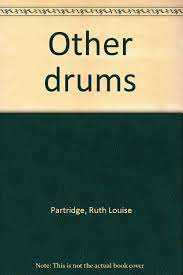Articles/Essays – Volume 09, No. 3
Nightfall at Far West | Ruth Louise Partridge, Other Drums
As first written, this was an “I’ve got a secret” manuscript, of the type which causes my blood pressure to rise alarmingly. The secret was that while it was a novel about Edward Partridge, first bishop of the Church, the author had changed the family name. Thus, while the author knew that this actually was important regional literature—something so scarce in our literary wasteland—who else could know, and who, not knowing, could care?
I don’t know how many manuscripts based on Mormon people I’ve seen by authors who have destroyed the validity of their work by concealing identities of the characters. When I point out the necessity of using actual names, the authors cry, “But I couldn’t use the names of real people!” And so their manuscripts, and their private secrets, end up in trunks.
Other Drums had sufficient merit to win the first prize of $1000 awarded by the Utah Institute of Fine Arts for best novel manuscript of 1967, despite the “secret” handicap and the additional drawback of a slow beginning. (Here, incidentally, is another characteristic of too many unpublished manuscripts—the author doesn’t really tell, as quickly as possible, what the story is about; but until the reader knows this, he has no interest in events.) Then began the discouraging task of trying to find a publisher who would risk offering the book to the public, who wouldn’t know the secret.
Now at last the novel, in revised form, is in print. It is clearly about Edward Partridge, and it begins in the first chapter and carries right on to the end. I am personally rather high on Other Drums, both for its merits and because regional novels of the Mormon genre are scarce as hen’s teeth, and I wish we had a thousand more.
Some of the best parts of the book are in the early chapters, concerning Edward Partridge’s conversion and ensuing travail. A propserous hat manufacturer, he sacrificed business, wealth, and home to be temporal leader of the Saints in Missouri—a position for which he felt entirely inadequate and unprepared, despite Joseph Smith’s complete confidence in him. Then there is the story of the wife, Lydia, taking her flock of five small daughters through frontier country hundreds of eventful miles to join her husband. The episode of being marooned in a Negro hovel enroute is unforgettable.
The strain of persecution undermined Edward’s health, causing an untimely death. The widowed Lydia and her brood went through the hardships of expulsion from Missouri. Then later, at Nauvoo, Lydia saw two of her daughters become plural wives of the prophet. The book ends with the martyrdom at Carthage Jail.
If Other Drums has flaws, they spring from the tendency to accept historical stereotypes: devout Saints are without flaw; apostates have no redeeming qualities, and never speak the truth; Gentile opponents are pukes and Philistines; Church leaders are infallible paragons. This attitude is reflected in the dialogue. All Mormons speak perfect English, regardless of national origin and limited education. (If this is so, it certainly is a testimony to the miracle of baptism.) On the other hand, the typical Missouri puke talks some of the thickest po’-white-trash dialect ever committed to paper. (I was anxiously awaiting the conversion of just one of them, to see what it did to his language, but the author didn’t provide an example.)
But all quibbling aside, I will say that while Ruth Louise Partridge worked thirty years on this book, it is worth the effort.
Other Drums. By Ruth Louise Partridge. Provo, Utah: Privately Published, 1974 (195 E. 4th North, Provo, Utah 84601). 377 pp., $7.00.


 Back to full Issue
Back to full Issue

